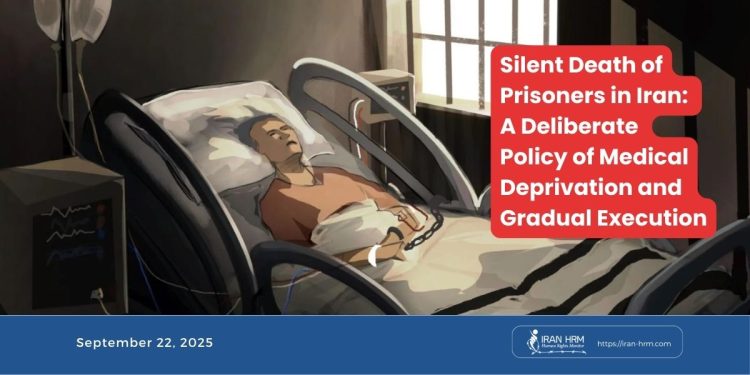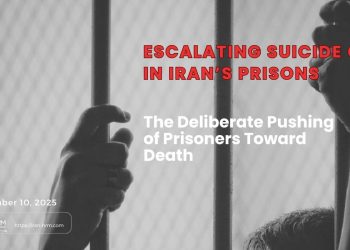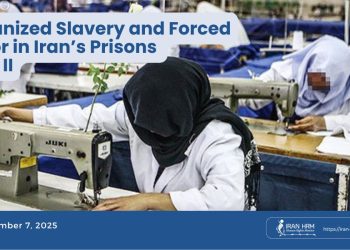Iran’s Prisons: Waiting Rooms of Death for Sick inmates
Executive Summary
“Every day of delayed treatment is a hidden death sentence.”
Reliable inside evidence shows that deaths in Iranian prisons are not caused by illness itself, but by a deliberate policy of medical deprivation. The recent death of Maryam Shahraki in Fardis prison and the critical condition of Somayeh Rashidi in Qarchak illustrate this lethal pattern. Prisoners with severe conditions such as cancer, heart disease, or spinal disorders are systematically denied access to treatment and left to die slowly and painfully. Qarchak Women’s Prison and Sheiban Prison (Ahvaz) are emblematic cases where officials intentionally block hospital transfers, condemning inmates to silent death.
Introduction and Framework
Medical deprivation in Iranian prisons is not accidental or due to resource shortages. It is a calculated tool for exerting pressure, inflicting torture, and ultimately eliminating prisoners, especially political detainees. Security and judicial authorities—not doctors—decide on hospital transfers, turning treatable conditions into fatal outcomes.
Amnesty International, in its investigative report “In the Waiting Room of Death,” warned that officials deliberately block sick prisoners from essential care, turning prisons into “waiting rooms of death.” UN Special Rapporteurs have repeatedly stressed that such practices may constitute torture and cruel, inhuman treatment.
Notable Cases of Silent Death
– Maryam Shahraki (~40), Fardis prison, severe cardiac symptoms dismissed as “stomach pain”; died on 12 September 2025.
– Jamileh Azizi, Qarchak prison, denied emergency care during heart attack; died on 20 September 2025.
– Somayeh Rashidi, Qarchak prison, epilepsy patient, seizures between 16–20 September 2025 dismissed as “malingering”; transferred only after collapse; doctors described her condition as “irreversible.”
– Seyed Abolhassan Montazer-Moqaddam (65), Qezel Hesar prison, with multiple severe conditions (heart, liver, diabetes, spinal issues), denied urgent surgery.
– Mohammad Ali Mahmoudi (56), Fashafouyeh prison, suffering from leukemia and heart failure, deprived of treatment.
– Mir Yousef Younesi (72), Fashafouyeh, repeatedly blocked from surgery at the last minute.
– Mohammad Ali Akbari Monfared (elderly), Fashafouyeh/Tajrish hospital, paralyzed and diabetic, hospitalized with shackles and risk of limb amputation.
– Eyoub Porkar (69) and Jaber Albo-Shokeh, Sheiban prison, both in critical condition, deprived of hospital transfer.
📌 The full list of sick and deceased prisoners, including details of illnesses and outcomes, is provided in the Annexed Table.
Annex: Table of Sick and Deceased Prisoners
| Name | Age | Prison | Medical condition / status | Date (Gregorian) | Outcome |
| Maryam Shahraki | 40 | Fardis (Karaj) | Severe cardiac symptoms misdiagnosed as stomach pain | 12 Sep 2025 | Deceased |
| Somayeh Rashidi | 42 | Qarchak (Varamin) | Epilepsy, repeated seizures | 16–20 Sep 2025 | Critical |
| Jamileh Azizi | – | Qarchak (Varamin) | Heart attack, denied transfer | 20 Sep 2025 | Deceased |
| Rahaleh Rahimi-Pour | – | Qarchak (Varamin) | Suspected internal bleeding, repeated unconsciousness | 2025 | ICU (with shackles) |
| Gholamreza Shahbazi | – | Central Karaj | Severe seizure | 24 Mar 2025 | Deceased |
| Mir Yousef Younesi | 72 | Fashafouyeh | Needs urgent surgery | 12 Jul 2025 report date | Transfers canceled |
| Reza Ehtemami | 70 | Fashafouyeh | Heart disease, arthritis, hypertension | 12 Jul 2025 report date | Denied care |
| Reza Akbari Monfared | 68 | Fashafouyeh | High cholesterol, arthritis | 12 Jul 2025 report date | At risk |
| Nasrollah Fallahi | 68 | Fashafouyeh | Gastrointestinal problems, prostate, hypertension | 12 Jul 2025 report date | At risk |
| Mohammad Ali Gerami | 66 | Fashafouyeh | Epilepsy, cervical arthritis | 12 Jul 2025 report date | At risk |
| Sepehr Ziaei | 65 | Fashafouyeh | Hernia (surgery needed), GI issues, prostate | 12 Jul 2025 report date | At risk |
| Majidreza Maki-Neyri | 64 | Fashafouyeh | Type 2 diabetes, hypertension, high cholesterol, shortness of breath | 12 Jul 2025 report date | Lacks medication |
| Mohammad Hassan Amidi | 64 | Fashafouyeh | Cataracts, prostate | 12 Jul 2025 report date | At risk |
| Siamak Amini | 60 | Fashafouyeh | Blood disorder, spinal weakness | 12 Jul 2025 report date | Unable to sit |
| Keyvan Rahimian | 60 | Fashafouyeh | Liver, stomach, and prostate problems | 12 Jul 2025 report date | At risk |
| Mohammad Ali Mahmoudi | 56 | Fashafouyeh | Leukemia, heart failure, diabetes, respiratory problems | 12 Jul 2025 report date | Denied treatment |
| Amirarsalan Shabani | 38 | Fashafouyeh | Severe epilepsy | 12 Jul 2025 report date | Needs treatment |
| Farzad Moazzami Goudarzi | 31 | Fashafouyeh | Severe migraines | 12 Jul 2025 report date | Needs treatment |
| Hamid Haj Jafar-Kashani | 43 | Fashafouyeh | Spinal problems, migraines | 12 Jul 2025 report date | Needs treatment |
| Sirus Fathi | 44 | Fashafouyeh | Bone marrow disease, severe platelet deficiency | 12 Jul 2025 report date | Needs treatment |
| Mohammad Ali Akbari Monfared | Elderly | Fashafouyeh / Tajrish hospital | Paralyzed, diabetic, prostate issues, severe leg infection, risk of amputation | 2 Sep 2025 | Hospitalized in shackles |
| Akbar Bagheri | – | Qezel Hesar | Irritable bowel syndrome, chronic pain | 11 Jun 2025 | Transfer blocked |
| Kamran Rezaeifar | – | Evin | Advanced stomach cancer, pulmonary embolism | 2025 | Treatment stopped |
| Seyed Abolhassan Montazer-Moqaddam | 65 | Evin / Gohardasht | Heart disease, hernia, liver disease, diabetes, prostate, kidney stones, spinal lesion | 8 Feb 2025 | Transfer blocked |
| Eyoub Porkar | 69 | Sheiban (Ahvaz) | Multiple conditions (diabetes, cardiac, hypertension); 17 years in prison | – | Denied care |
| Jaber Albo-Shokeh | – | Sheiban (Ahvaz) | Risk of blindness | – | Transfer denied |
| Two unnamed prisoners | 40 & 54 | Roodsar | Heart attack / stomach bleeding | 3–7 Mar 2025 | Deceased |
Mechanisms of Medical Deprivation
– Deliberate delays in transfer: The deaths of Maryam Shahraki and Jamileh Azizi illustrate how intentional delays amount to death sentences.
– Security control over medical decisions: Mir Yousef Younesi’s transfer was canceled three times at the last minute. Officials such as Seyed Abdollah Mortezavi publicly claimed “there are no limits on hospital transfers”—contradicting facts.
– Labeling patients as malingerers: Somayeh Rashidi’s seizures were dismissed as “malingering,” causing life-threatening delays.
– Humiliating conditions of transfer: Rahaleh Rahimi-Pour was sent to ICU only with handcuffs and shackles, delaying treatment.
– Forcing inmates to pay for treatment: In Fashafouyeh, prisoners must buy essential drugs like insulin and cardiac medicines themselves.
– Failure to separate prisoners: Political detainees housed with violent offenders—e.g., Alireza Shir-Mohammadi, stabbed to death in Fashafouyeh.
Legal Analysis (Concise)
– Right to Life (ICCPR, Article 6): Preventable deaths like Maryam Shahraki’s violate this right.
– Ban on Torture (ICCPR Article 7 / UDHR Article 5): Labeling sick inmates as malingerers and shackling them in ICU is cruel treatment.
– Mandela Rules (24–27): Prisoners must receive healthcare equal to the community.
– Right to Health (ICESCR Article 12): Blocking transfers breaches this fundamental right.
– Systematic pattern: The widespread nature of these violations may amount to crimes against humanity (Rome Statute, Article 7).
Conclusion and Call to Action
Iran’s prisons have become waiting rooms of death for sick inmates. The recent deaths in Fardis and Qarchak and the life-threatening conditions in Fashafouyeh, Sheiban, and Qezel Hesar reveal a deliberate and systematic policy of medical deprivation.
We call on the UN Human Rights Council, UN Special Rapporteurs on torture and the right to health, and all international human rights bodies to:
– Establish an independent fact-finding mission to investigate suspicious deaths;
– Demand immediate and unhindered medical care for all sick prisoners in Iran;
– Hold Iranian officials accountable for these systematic violations.







